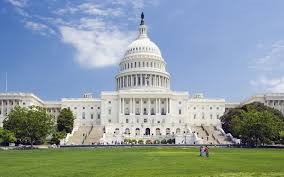
ATLANTA – The $2 trillion economic stimulus package the U.S. Senate passed Wednesday night to deal with the impacts of coronavirus was historic, far eclipsing the $831 billion Congress doled out during the Great Recession in 2009.
But depending on how long COVID-19 keeps sickening and killing Americans, the record bailout may be too little to put businesses and workers back on their feet.
“If we have a V-shaped recession, it will probably be sufficient,” said David Sjoquist, an economics professor at Georgia State University. “If it lasts longer, that will not be enough.”
Senators voted 96-0 to approve the stimulus package. The U.S. House of Representatives is expected to pass it on Friday and send to President Donald Trump for his signature.
Besides its unprecedented size, the bailout steers hundreds of billions of federal dollars to a variety of parties affected by the economic impact of coronavirus.
The package would deliver:
- $500 billion in loans to distressed large companies, including $50 billion for airlines.
- $350 billion in loans to small businesses affected by the virus.
- $250 billion in direct payments to individuals and families.
- $250 billion in unemployment insurance benefits.
- $150 billion to state and local governments.
- $130 billion to hospitals hit hardest by COVID-19.
Atlanta-based Delta Air Lines, one of Georgia’s largest employers, has been severely affected by a significant drop in travel since the pandemic struck. In a letter to Delta employees last week, CEO Ed Bastian reported the airline’s March revenue is expected to decline by almost $2 billion over the same month last year, while the financial projection for April is even worse.
All Delta officers have been hit with a 50% pay cut through the end of June, with directors and managing directors seeing their pay reduced by 25% during the same period.
Bastian announced he will go without pay for the next six months.
“I know everyone is concerned about the security of your jobs and pay,” the CEO wrote. “In this unpredictable environment, we can’t take any options off the table, but any steps that would affect your jobs or pay rates would be the absolute last thing we would do, and only if necessary to secure Delta’s long-term future.”
Nathan Humphrey, Georgia director of the National Federation of Independent Business, said the portion of the stimulus package aimed at small businesses will help small business owners who have been affected psychologically by the pandemic.
“Unlike with corporations, our guys, when they lay their employees off, they know them intimately,” he said. “They live in the same communities. It’s a lot more personal to them.”
U.S. Sen. David Perdue, R-Ga., said the main objective of the economic stimulus is to let employers maintain their relationships with their employees by giving them the liquidity to do so.
“We need to make sure we don’t kill the economy while we’re killing this disease … so when people get well, they’ll have a job to go back to,” Perdue said on the Senate floor Wednesday as the bill was being debated.
“We are now taking action to protect our health care professionals, strengthen our hospitals and treatments, and support hardworking families and small businesses who are the heartbeat of America,” Sen. Kelly Loeffler, R-Ga., added following the vote.
Both Perdue and Loeffler voted for the bill.
To make sure Americans out of work can cover their bills while they’re without a paycheck, the stimulus package includes direct payments of $1,200 to individuals with adjusted gross incomes of up to $75,000 a year. Married couples with adjusted gross incomes of up to $150,000 a year will receive $2,400 plus an additional $500 per child.
The dollar amount of direct payments to Americans and the per-child payments will decline gradually until they phase out completely for individuals with adjusted gross incomes of $99,000 and above, and for married couples with adjusted gross incomes of $198,000 and above.
While officials in the Trump administration have talked about getting the checks out in as little as two weeks, the logistics of sending out so many checks coupled with the need for the Internal Revenue Service to determine who qualifies for which amount could delay the money into May.
Sjoquist said state and local governments are in dire need of the $150 billion due to come their way.
“Sales are down. People aren’t working,” he said. “Tax revenues are going to decline significantly.”
Some governors, notably New York’s Andrew Cuomo, have complained the funding earmarked for state and local governments hard hit by COVID-19 won’t be nearly enough and that Congress will have to come back later and provide another stimulus measure.
Sjoquist said the stimulus package likely will be sufficient as long as the pandemic doesn’t stretch into the summer or fall. He said the nature of the coronavirus-driven recession bodes for a quicker recovery than past economic downturns.
“It’s not an issue of people losing their homes or that there’s no demand,” he said. “This is really a case of people holding back on spending because they’re afraid to go to stores. … Once the virus is over, the recovery will be pretty quick.”